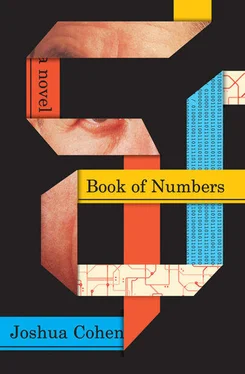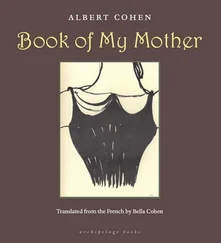The English language is like a tunnel with endless clearance — an eye or ear too forgiving. Americans especially can usually get where someone’s coming from. This has to do with being mediated, having seen and heard enough screenwise to know how Yugo gangsters inflect, when they plot amongst themselves without subtitles. How Russian assassins dress, when they’re planning to explode a motorcade. We have every variation, not least the counterintuitive. But I can’t say I can do the same offscreen and within another culture. I couldn’t dig deep enough into his umlauts to judge them native. But I could still suspect some curry in his wurst. His skin was either racially tan or tanned. How he poured. How he drank. How he did absolutely nothing else. How he wouldn’t leave my face. And so I slumped to show him his reflection in my baldspot — and then he finished — to repel him by his reflection — and then he left. Coins on the table, no tip. Just a cock of the head. Tongue out. Like he was aiming.
\
Probably just an overreaction. Probably he’d just never been around a Jew before.
In the next car another passenger sat reading another book. Not ereading an ebook. The passenger just closed the thing. And took a euro billsized card, an indexcard that spanned the indexfinger to the middle of the hand, and marked the page. No cornering, no folds. Cards. Reminders of the census. Cards were how censuses used to be conducted. Once, each city, each town, each village had an official going door to door, collecting information, marking each dwelling’s data with pen or pencil on card. Each municipality collected its cards and summarized their stats in a report, and each bound report was put on a train and relayed to the capital. I’m wondering whether any of their couriering officials ever read them if bored on the journey. I’m just guessing that another book, containing and summarizing the stats of all the municipal books, would have to be compiled in the capital.
But then at the turn of the century—1890? 1880? I forget, my exactitudes are later — the census was automated, at least partially automated, first in America and only later in Europe. In 1933 the Nazis counted only in Germany, but in 1939 they counted in all the annexations too, counting Austria, Sudetenland, Memelland, counting Poland, the Generalgouvernement, at least in part. The censustakers distributed to each household a strip of paper, a survey whose filling was mandatory and whose findings the takers themselves coded onto a card by a system of punched holes, a punchcard. This citizen had blond hair, punch, this noncitizen had black hair, punch, cranial and facial type, nose type (straight or curved, weakly or strongly bent in which cardinality), tabulating religion (column 22 hole 1 was Protestant, hole 2 Catholic, hole 3 annihilated). Did he or she have one Jewish parent or two? even one Jewish grandparent? Any disabilities? and/or disfigurements? Glasses and/or hearing aid would help to complete the form — condemn. An accounting tallying poetically, still — all identities are voids.
The punchcard and its calculating machine — the storage/memory and processor of the earliest computing — were invented in 1890 by a German American from Buffalo, NY, named Hollerith, whose company became the company that became IBM, which, in turn, licensed the technology to the Nazis (but don’t get all nitpicky angry if online contradicts me and says the year was 1889 and the city was Albany and the inventor’s name was Höllerith and the licensing was done by an IBM subsidiary).
The technical execution of the punchcard’s primitive programming was modeled on textiles, specifically on how looms used cards to separate threads into patterns for weaving, for embroidering things like swastika bands and yellow stars, though the inventor himself always maintained he’d initially been inspired to adapt the process by a train journey he’d taken through the American West — by the tickets required, their validation, their punching.
The conductor, a sturdy peasant in matching prussic pants and vest over boiled nasty sputumnal shirt, strapped his monkeycap and cowbelled into the car — weaved down the aisle and took your ticket and like a censustaker, with a small metal squeezer apparatus, punched it, put a hole in it, marking your fare and so marking your fate, your final destination. A flurry of chad, white discs of paper floating floorward like the Polish snow that greeted the steerage.
Genocide, like publishing, is 66.6 % a problem of distribution — how to get the people/things you need to be killed where they need to be killed when they need to be killed, and at a minimum. How to get Halbwachs to Buchenwald to meet his dysentery. How to get the best Yiddish poets of Kiev all to Moscow, to the Lubyanka’s basement, on the same summer night for mass execution. How to get Mandelstam to the Second River transit camp by Vladivostok in time for his official cause of death, which was frozen “unspecified.”
Nowadays publishers just invest in writers, they have the writer’s work edited, copyedited, proofed, but then they have to print it and make it public (murder). Nowadays writers are murdered mainly by their publishers, by being sent off to press and then to market.
American printers used to be the best in the world (the linotype, 1870–80? by Mergenthaler?), until for margin considerations too caustic to countenance, they merged with or were acquired by foreign companies, and so migrated abroad. Or else the companies uprooted themselves, keeping their corporate registries but moving their plants to Mexico, or China, the country that invented the book but bans books, and imprisons its authors — and in which, about two centuries before Christ, the Emperor I’d butcher his name erected a great firewall all around his Empire, buried its scholars alive, and then burned all their books, either to stifle their critique or standardize the writing system (the same Emperor whatever his name standardized his Empire’s currency, busy man) — and in which, about two millennia after Christ, this book I’m not writing is scheduled to be printed, though it would still have to be approved by the censors before being translated, and before any of the workforce enslaved to its production, any of the billion other Chinese, would be able to read it.
If only they had time to read it — hordes of the desexualized toothless working alongside one another like stripped gears, loading and impressing by roll, gathering the signatures, by octavo, by quarto, for binding—12 hours/day, 6 days/week, roughly ¥12 or $2/day, approx $52/month, approx $624/year. I’ve read the same journalism as everyone else, and I’m still not sure what to fall for — either any job is a good job, any pay is good pay, or China has only one factory, is only one factory, and its only product is suicide.
After China the book — because only after China would my ms. be a book — would have to be loaded onto boats and shipped back to America, to my publisher’s distributor in Delaware, or Maryland, or Virginia. The distributor would have to send the books out by truck and train, fraught stock freighted to whatever bookstores still existed, which would sell whatever inventory would sell and then return whatever wouldn’t — returning it damaged unremainderable — and so again the trucks with their squalid cabs shrieking libertarian radio, and so again the trains chuggachuggachoochooing through backyards unmown and littered with stormwater kiddiepools, all the way back to the distributor again, only to be turned around again and redistributed, sent to that minor inferno of upstate NY, Buffalo, where they’d be pulped, where they’d be recycled, in a factory owned by Canadians.
Читать дальше












